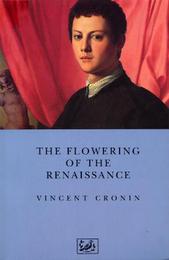
|
The Flowering of the Renaissance
Paperback / softback
Main Details
| Title |
The Flowering of the Renaissance
|
| Authors and Contributors |
By (author) Vincent Cronin
|
| Physical Properties |
| Format:Paperback / softback | | Pages:336 | | Dimensions(mm): Height 234,Width 153 |
|
| Category/Genre | Art History
General |
|---|
| ISBN/Barcode |
9780712698849
|
| Classifications | Dewey:945.05 |
|---|
| Audience | |
|---|
| Illustrations |
1
|
|
Publishing Details |
| Publisher |
Vintage
|
| Imprint |
Pimlico
|
| Publication Date |
10 September 1992 |
| Publication Country |
United Kingdom
|
Description
Following the collapse of the Medici rule in 15th century Florence, the centre of Renaissance activity moved first to Rome and finally to Venice. In the Rome of Julius II and Leo X which Michelangelo remoulded and beautified, in the Venice of Titian, Tintoretto and Palladio, as well as the courts, the Renaissance reached the height of its splendour, not only in the visual arts but also in the theatre, history, biography, epic poetry and music. This is the sequel to "The Florentine Renaissance" and provides a guide to every aspect of the Italian Renaissance.
Author Biography
Vincent Cronin was educated at Ampleforth College, Harvard University, and Trinity College, Oxford, from which he graduated with honours in 1947. In addition to being a recipient of a W.H. Heinemann Award (1955) and a Rockefeller Foundation Award (1958), Cronin is a fellow of the Royal Society of Literature. His works have been widely translated into European languages. He died in January 2011, aged 86.
ReviewsAn evocative picture of Rome at the turn of the sixteenth century... the account of Michelangelo is particularly memorable. At the same time Mr Cronin places the Renaissance firmly in its historical, political and religious setting... The book is beautifully written, and in his discussion of such artists as Titian and Giorgione Cronin shows a rare talent for describing and dissecting paintings. * Observer * It is Mr Cronin's outstanding achievement to have given this truly chaotic period a form which makes it intelligible - but without distorting its meaningthrough over-simplification. * Daily Telegraph *
|